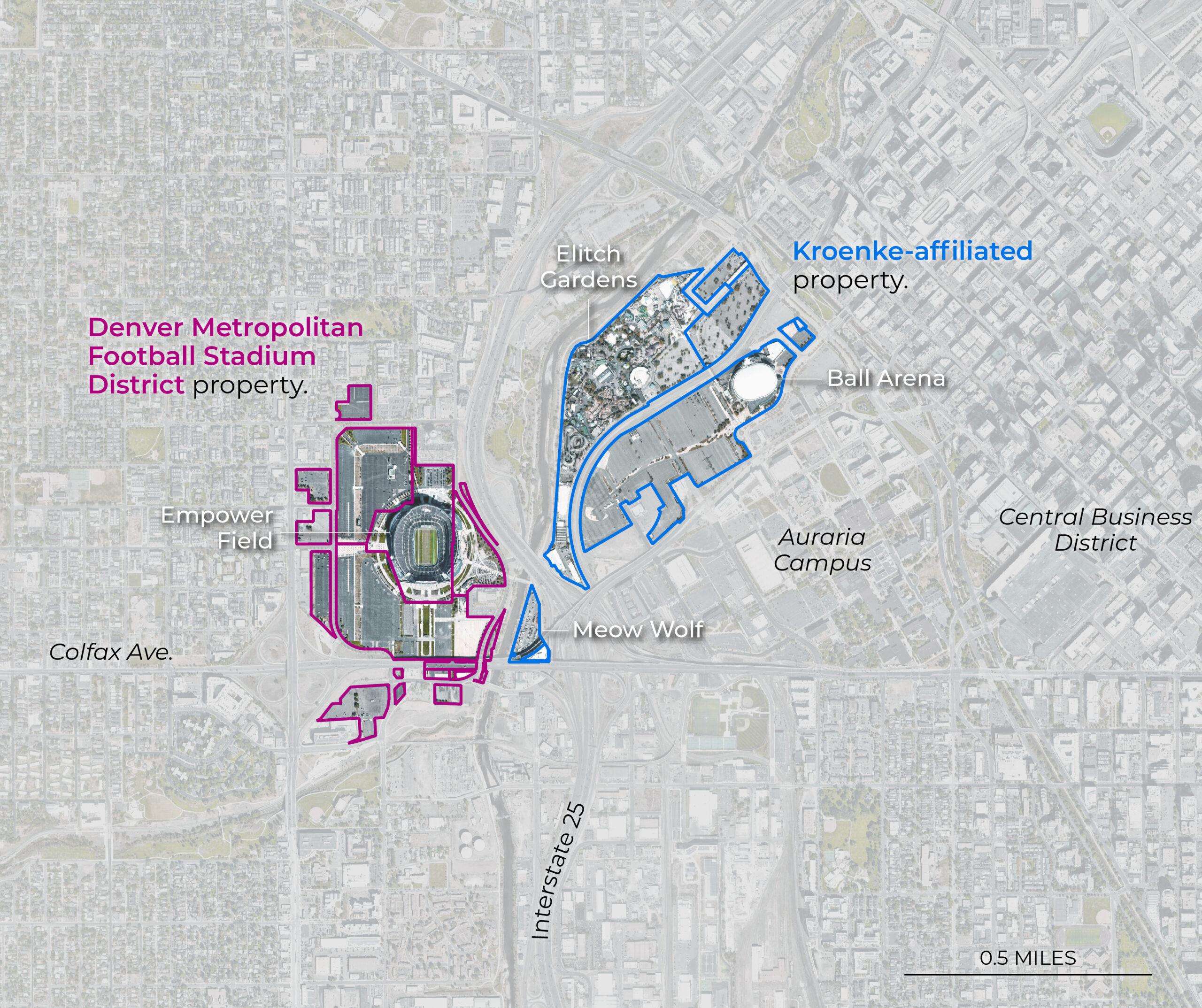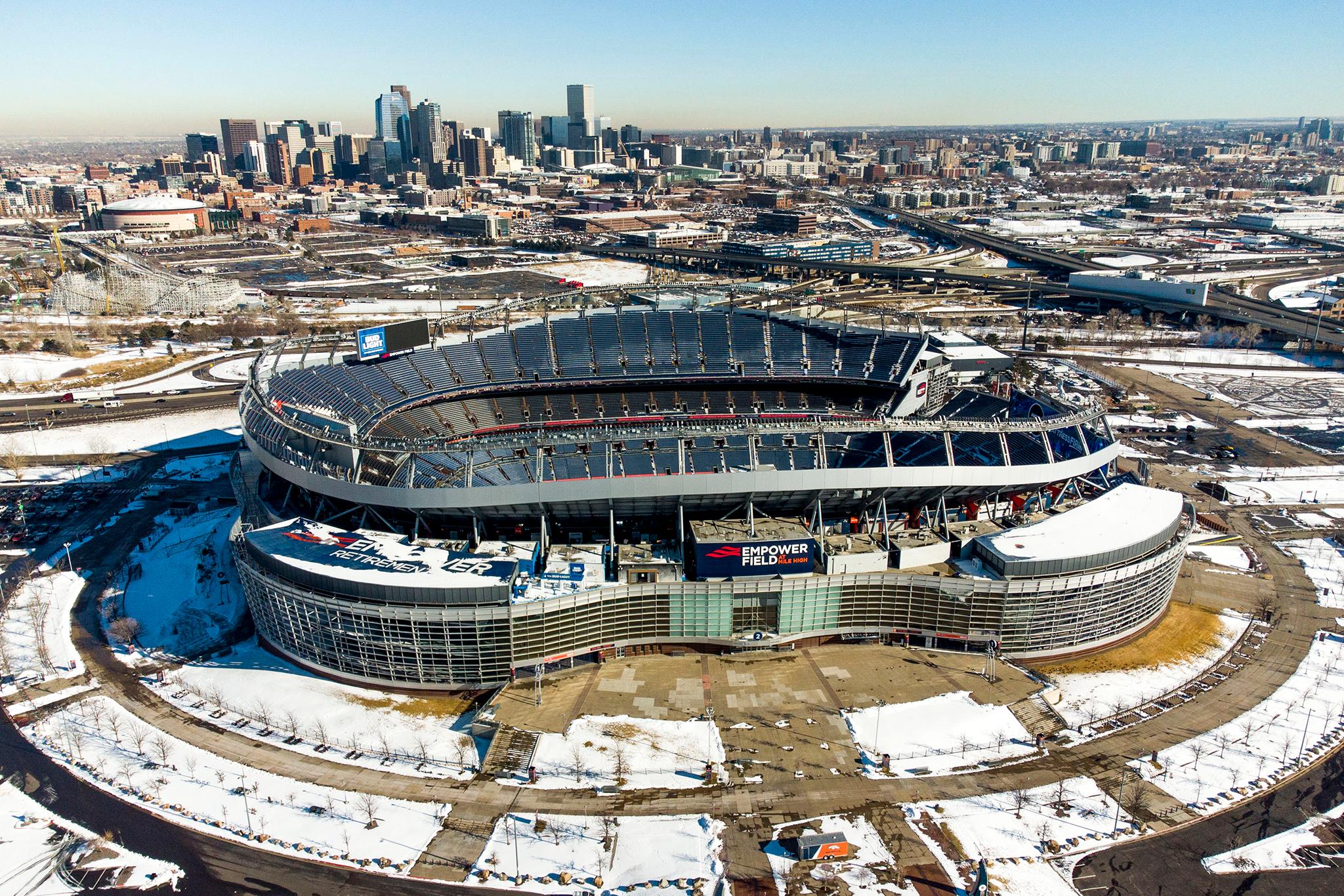The future of central Denver may one day be sketched out at a Walton family reunion.
Along with his reported $4.65 billion purchase of the Denver Broncos, Rob Walton and his family will, once approved as the new owners, have a big say in the development of more than 50 acres of land around Empower Field, and any future stadium that replaces it.
Meanwhile, entities controlled by or in partnership with his cousin Ann's spouse, Stan Kroenke, already have development plans set for an adjacent area of more than 100 acres around Ball Arena, including the site of Elitch Gardens.
Combined, that puts more than 150 acres of prime land in Denver under the influence of two branches of one of the wealthiest families in the world.
"It's perhaps the next frontier for expanding downtown Denver," said Brad Segal, president of Progrssive Urban Management Associates, who has decades of experience redeveloping downtown Denver. These are a small number of owners who are related and "who can figure out what to do with a chunk of land of that size. I don't think in recent history that you've had that opportunity."
Rob Walton is the son of Sam Walton, who co-founded the retailer Walmart with his brother James "Bud" Walton in 1962. Ann Walton, Bud's daughter, is married to Kroenke, who owns the Nuggets, Avalanche, Rapids and Mammoth, and the parking lots and land adjacent to Ball Arena, including Elitch Gardens.
A project to turn that area into a mixed-use combination of housing, retail, parks and even a school is now in the planning stages and called The River Mile. Restoration of the South Platte River is underway in that stretch. A separate proposed development by Kroenke would encompass an additional 55 acres of parking lots south of Ball Arena.
It all stretches along the river and eventually connects to land controlled by Stadium Investment Corporation, a project of the Metropolitan Football Stadium District and the Broncos, formed to develop surface parking lots to generate some income to pay for maintenance of the stadium.

In 2019, a "Stadium District Master Plan" was approved by the Denver City Council, and provides guidance for a mixed-use neighborhood on more than 50 acres of land now used as the south parking lots for Empower Field. But as the team's sale grew near, the project was stalled. It's not yet known how, or if, it will come together under a new owner.
"The property owner paused their redevelopment plans in 2020, and so the city is not currently reviewing anything for this site and there are no next steps underway at this time," wrote Laura Swartz, communications director for Community Planning and Development. "If the Stadium District wanted to move forward with a development proposal in the future, it would need to align with the community's vision and recommendations in the adopted plan."
But while citizens and the government will have a say -- and there are an array of names and corporate entities involved in the projects that stretch along Auraria Parkway from Speer to Federal -- the one that matters the most now is: Walton.
Records show that the Stadium Investment Corporation, a nonprofit, was formed in 2019, and has a board of directors of five people. Three are chosen by the Metropolitan Stadium Football District, made up of representatives from six counties. Two are chosen by its only major tenant, the Broncos
That would seem to give the government representatives the upper hand on deciding the future. But with the Broncos lease coming up for renewal at the end of 2030, essentially giving the team a chance to relocate, the new owner will arrive with considerable leverage in exchange for his $4.65 billion.
"It's also an unique opportunity for the city to leverage community benefits out of a development of the scale with such few owners, and with the city crying for so many needs in terms of housing and affordable housing," said Segal.
Matt Sugar, who is listed as the registered agent for Stadium Investment Corporation, and also works for the Metropolitan Football Stadium District, said the Broncos will not directly profit from the development of stadium property. It's unknown if proceeds of development could help pay for a new stadium.
Does the Metropolitan Football Stadium District know what the Broncos' new potential owners would want to do with the south parking lot development?
"The answer is no," Sugar said. "At some point, I'm thinking in the future, we will hear more and know more about what those expectations are and what they would like to do."
But Stan Kroenke's history shows there is more than one way to profit from a development.
In addition to his Denver teams and properties, Kroenke also owns the Los Angeles Rams. He spent $5 billion there to build Sofi Stadium as home to both his own team and the Los Angeles Chargers.
He received no taxpayer help in construction of that stadium, but he also controls development rights on the 298-acre site and intends to pay for at least part of the stadium through development of an array of office buildings, housing and retail. That's similar to how development of parking lots at Empower Field is intended to help pay for maintenance and upkeep.
But that's Los Angeles, the nation's second largest TV market, and a giant hole in the NFL's footprint until Kroenke filled it.
The Broncos may be an iconic franchise, beloved by fans throughout the Rocky Mountain West and around the world, but Denver is the nation's 17th largest TV market. It's far too early to know whether Walton might try to use the leverage of an expiring lease to get taxpayer help for a new stadium.
It's not unheard of. The Broncos paid 25 percent of the cost of the current stadium, while taxpayers contributed 75 percent through a sales tax enacted by voters in the six-county Metropolitan Football Stadium District. That tax expired at the end of 2011 and would have to be renewed by voters if Walton sought taxpayer help.
Also unknown is what the change in owners will mean for residents of Sun Valley, the neighborhood surrounding the stadium. After the team was put up for sale, residents expressed hope that the stadium master plan would move forward someday.
On Wednesday, one resident said she was looking forward to working with the new owner
"I'm excited just to have a decision made, so we can start planning for what will come," said Jeanne Granville, the president of the Sun Valley Community Coalition and member of the Westside Stadium Community Coalition. "We have no reason but to be happy. We have a plan, and we're eager to share it with the new owner and they have the opportunity to really do something impactful for both the long term vision of that piece of property and for the community."













